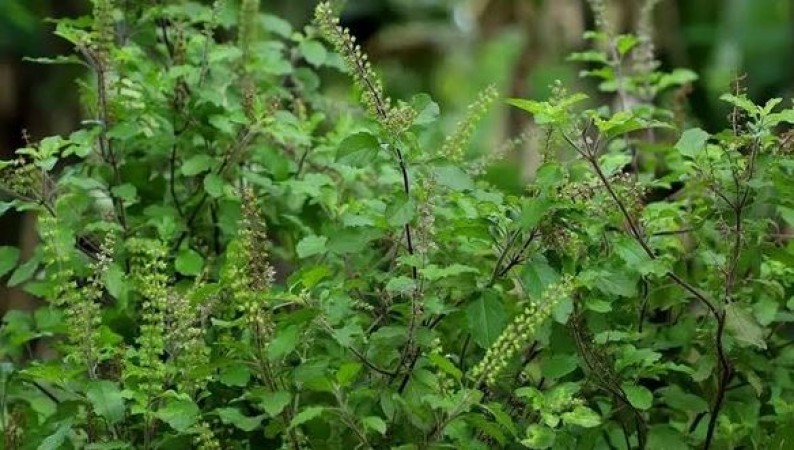
Basil, commonly known as tulsi in India, is more than just a culinary herb; it holds significant cultural and medicinal importance. While most people are familiar with the common green basil, there are several other varieties, each with unique properties and benefits. Understanding these different types of basil can help you make the most of their diverse uses, whether for health, skincare, or spiritual practices. Here’s an in-depth look at the five primary types of basil and their special characteristics.
1. Shyam Tulsi (Holy Basil)
Also known as Krishna Tulsi, Shyam Tulsi is recognized by its dark purple or greenish-purple leaves. This variety is highly revered in Hindu tradition and is often associated with Lord Krishna. Shyam Tulsi is known for its potent medicinal properties, which include:
Antioxidant Properties: Shyam Tulsi is rich in antioxidants that help neutralize free radicals in the body, thereby reducing oxidative stress.
Anti-Inflammatory Benefits: It helps in reducing inflammation, which can be beneficial for conditions such as arthritis and other inflammatory disorders.
Immune System Support: Regular consumption of Shyam Tulsi can enhance immune function, making the body more resistant to infections.
2. Ram Tulsi (Sweet Basil)
Ram Tulsi, also referred to as Sri Tulsi or Sweet Basil, is characterized by its green leaves and a more subtle, sweet flavor compared to other varieties. This type is commonly used in religious rituals and has the following benefits:
Digestive Health: Ram Tulsi aids in improving digestion and can help alleviate digestive issues such as bloating and gas.
Anti-Stress Effects: It is known for its adaptogenic properties, which help the body cope with stress and reduce anxiety.
Flavor Enhancer: In culinary uses, its sweet flavor enhances the taste of various dishes and beverages.
3. Shvet Tulsi (White Basil)
Shvet Tulsi, or Vishnu Tulsi, is distinguished by its white or pale pink flowers. This variety is less common but offers a range of unique benefits:
Skin Health: Shvet Tulsi is known for its skin-soothing properties and can help in treating skin conditions such as acne and eczema.
Respiratory Health: It supports respiratory health by aiding in the relief of symptoms related to colds and flu.
Anti-Viral Properties: This type of basil has natural anti-viral properties that can help the body fight off viral infections.
4. Van Tulsi (Wild Basil)
Van Tulsi, or Wild Basil, features lighter green, narrow leaves and a distinctive lemony aroma. It is typically used in traditional medicine and has the following advantages:
Immune Boosting: Van Tulsi is a rich source of vitamin A, which is crucial for maintaining a healthy immune system.
Digestive Aid: It helps in improving digestion and is often used in herbal teas to soothe digestive discomfort.
Detoxification: The herb aids in detoxifying the body by promoting the elimination of toxins.
5. Kapalbhati Tulsi (Kapoor Tulsi)
Kapalbhati Tulsi, also known as Kapoor Tulsi, is recognized for its fragrant, aromatic leaves and its use in various therapeutic applications. Its benefits include:
Mental Clarity: This variety is believed to enhance mental clarity and focus, making it beneficial for cognitive functions.
Stress Relief: It has calming effects that can help reduce stress and promote relaxation.
Antibacterial Properties: Kapoor Tulsi has strong antibacterial properties that can help in fighting bacterial infections.
Each type of basil offers distinct benefits, making it a versatile addition to both traditional remedies and modern wellness practices. By incorporating different varieties of basil into your routine, you can take advantage of their unique properties to support overall health, enhance skin and hair care, and enrich spiritual practices. Whether you are using them in cooking, as part of a herbal remedy, or in rituals, understanding these different types of basil can help you appreciate their full range of benefits.
India and Singapore Strengthen Collaboration in Future-Focused Sectors
If Tea Spills or You Touch a Hot Pan, Follow These Immediate Measures for Relief
How to Prevent Fever and Cough During the Rainy Season: Follow These Tips